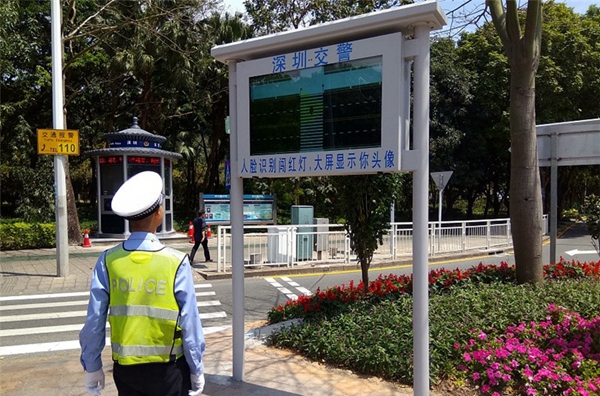Facial recognition helps rule traffic
|
|
|
A smart traffic system launches at a crossroad in Shenzhen, Guangdong on April 17, 2017. [File Photo] |
The installment of facial recognition facilities at busy crossroads in some Chinese cities has substantially reduced the chaos caused by crowds of jaywalkers and unruly cyclists.
Cameras take four snapshots of pedestrians or cyclists ignoring traffic lights and make a screenshot from a simultaneous video lasting for 15 seconds.
In Jinan, capital of East China's Shandong Province, any violators caught by the system either face a fine of 20 yuan (US$3) or are required to don a yellow costume to act temporarily as auxiliary traffic police for a specified time.
"The firsthand experience of being an auxiliary police officer can be a vital lesson for those who challenge traffic rules," said Wang Rilei, based with the Lixia Division of the Jinan Traffic Police Squad.
The facial recognition system has spotted 6,200 non-vehicle traffic violations in the city since its launch last month.
"Traffic order at crossroads has been obviously improved in only one month and an increasing number of pedestrians start to obey traffic signals and use pedestrian crossings [rather than simply dashing across the road anywhere as in the past]," said Duan Fuyong, deputy team leader of the Jinan Traffic Police Squad.
However, the penalties of jaywalkers don't simply end with fines or education. The information is passed on to employers or the local community, seeking to add an element of shame.
However, the punishment has led many to question its legitimacy in terms of protecting personal privacy.
People who oppose the facial recognition application say the police are not supposed to reveal personal information as a means of imposing a civil penalty.
However, Liu Xiaojing, an officer from the Publicity Office of Jinan Traffic Police Squad, argued while exposing the facial image of the rule breakers, traffic authorities would not reveal their complete personal information such as ID number, addresses and employers to the public.
Wang Zongyu, vice professor of the law school of the Renmin University of China, observed that it was encouraging to see law enforcement divisions seeking new approaches to keep cities running in an orderly way, but the critical point is whether the actions pass a bottom line.
According to Wang, law enforcement divisions should not reveal personal information unless they are empowered to do so according to law. In this case, the laws do not stipulate whether the violators' information should be publicized, meaning traffic authorities do not have the legal ground for doing so.
The facial recognition system has also been adopted by Chongqing Municipality and Fuzhou, Fujian Province.
